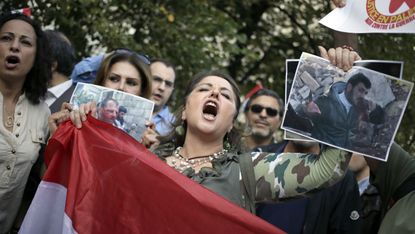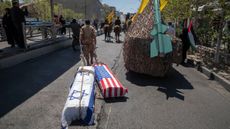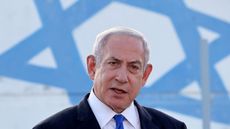Syria's secret chemical weapon attacks
Four year years after Assad promised to get rid of his chemical stockpile, gas attacks continue

The Syrian government is maintaining and regularly deploying a stockpile of chemical weapons, according to an investigation by the news agency Reuters.
In 2013, after Syrian forces used chemical weapons against rebel fighters, killing scores of civilians, an international outcry and the threat of military retaliation led President Bashar al-Assad to promise to dismantle his chemical weapons under the supervision of the US, Russia and the UN.
Many diplomats and weapons inspectors now believe that pledge was a ruse and suspect that, while appearing to cooperate with international inspectors, Assad's regime "secretly maintained or developed a new chemical weapons capability", reports Reuters.
Subscribe to The Week
Escape your echo chamber. Get the facts behind the news, plus analysis from multiple perspectives.

Sign up for The Week's Free Newsletters
From our morning news briefing to a weekly Good News Newsletter, get the best of The Week delivered directly to your inbox.
From our morning news briefing to a weekly Good News Newsletter, get the best of The Week delivered directly to your inbox.
The news agency cites dozens of officials and diplomats who claim the Assad government has repeatedly hampered inspectors and has conducted "dozens" of chlorine attacks and "at least one major sarin attack", killing more than 200 and leaving hundreds more injured.
In June, the Organisation for the Prohibition of Chemical Weapons claimed the banned nerve agent sarin had been used in an attack in northern Syria in April. A joint UN and OPCW investigation earlier in the year found Syrian government forces used chlorine gas in three attacks in 2014 and 2015.
"The extent of Syria's reluctance to abandon chemical weapons has not previously been made public for fear of damaging international inspectors' relationship with Assad's administration and its backer, Russia," the Israeli news outlet Haaretz reports.
Despite overwhelming evidence Assad has continued to deploy chemical weapons, the Russian Foreign Ministry spokeswoman Maria Zakharova laid the blame squarely on allied forces, saying there was evidence that the West is supplying chemical weapons to militants in Syria.
"Yes, it's true," she told the state-funded Vesti FM radio station on Thursday morning. "Western countries and regional powers are directly and indirectly supplying militants, terrorists and extremists in Syria with banned toxic substances".
Create an account with the same email registered to your subscription to unlock access.
Sign up for Today's Best Articles in your inbox
A free daily email with the biggest news stories of the day – and the best features from TheWeek.com
-
 Do youth curfews work?
Do youth curfews work?Today's big question Banning unaccompanied children from towns and cities is popular with some voters but it is contentious politically
By Harriet Marsden, The Week UK Published
-
 'Sleaze baack!'
'Sleaze baack!'Today's Newspapers A roundup of the headlines from the US front pages
By The Week Staff Published
-
 Quiz of The Week: 20 - 26 April
Quiz of The Week: 20 - 26 AprilPuzzles and Quizzes Have you been paying attention to The Week's news?
By Rebecca Messina, The Week UK Published
-
 How would we know if World War Three had started?
How would we know if World War Three had started?Today's Big Question With conflicts in Ukraine, Middle East, Africa and Asia-Pacific, the 'spark' that could ignite all-out war 'already exists'
By Harriet Marsden, The Week UK Published
-
 The issue of women and conscription
The issue of women and conscriptionUnder the radar Ukraine military adviser hints at widening draft to women, as other countries weigh defence options amid global insecurity
By Harriet Marsden, The Week UK Published
-
 Will Iran risk all-out war with Israel?
Will Iran risk all-out war with Israel?Today's Big Question Tehran has not wanted to be directly involved in the Middle East conflict so far. But that could be about to change
By Chas Newkey-Burden, The Week UK Published
-
 Ukraine's unconventional approach to reconstruction
Ukraine's unconventional approach to reconstructionUnder the radar Digitally savvy nation uses popular app to file compensation claims, access funds and rebuild destroyed homes
By Harriet Marsden, The Week UK Published
-
 Will Ukraine's leadership reset work?
Will Ukraine's leadership reset work?Today's Big Question Zelenskyy hints at ousting of popular military chief, but risks backlash amid dwindling munitions, delayed funding and Russian bombardment
By Harriet Marsden, The Week UK Published
-
 Imran Khan sentenced to 10 years: how powerful is Pakistan's military?
Imran Khan sentenced to 10 years: how powerful is Pakistan's military?Today's Big Question The country's armed forces ignore country's economic woes, control its institutions and, critics say, engineer election results
By Harriet Marsden, The Week UK Published
-
 What is Iran's endgame?
What is Iran's endgame?Today's Big Question Tehran seeks to supplant US and Saudi Arabia as dominant power in Middle East while forcing Israel to end Gaza war
By Harriet Marsden, The Week UK Published
-
 Israel proposes two-month pause in Gaza war in exchange for all Hamas hostages
Israel proposes two-month pause in Gaza war in exchange for all Hamas hostagesSpeed Read Deal doesn't include an agreement to end war, but might be 'the only path that could lead to a ceasefire', said US officials
By Harriet Marsden, The Week UK Published